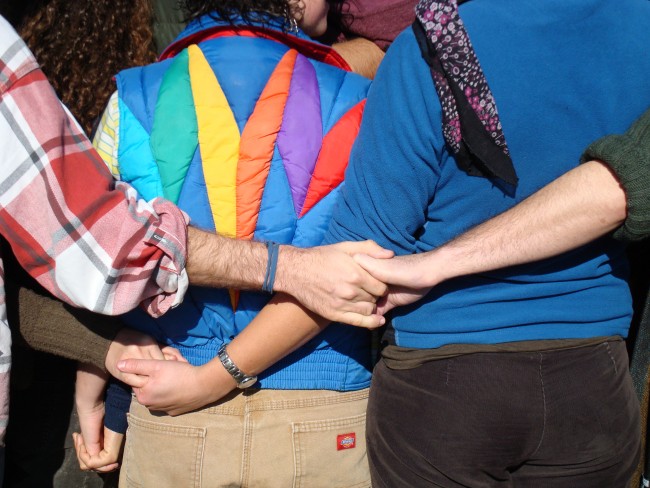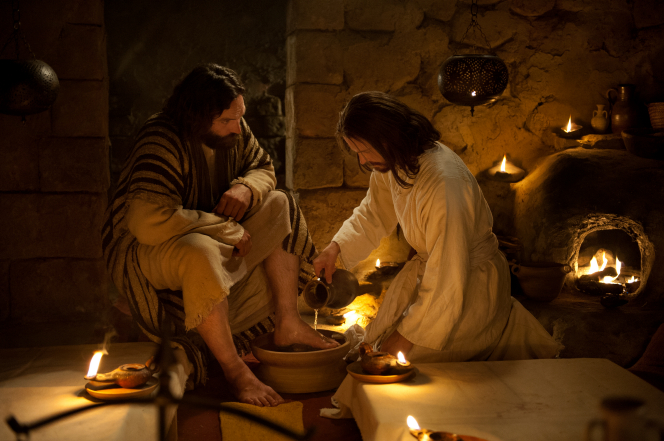
What Jesus’ Washing of the Feet Teaches About Love
Aside from the Atonement itself, Jesus’ washing of the feet of his disciples remains one of His most striking acts of love.
In our eternal quest to become like Jesus Christ, His example in the washing of the feet stands as an act of love that we can reasonably strive to emulate.
Jesus’ act of washing His disciples’ feet served as a gospel ordinance. Like other ordinances, washing feet has layered meaning and symbolism. We can learn many lessons when we explore these meanings to help us follow Christ’s example.
Love with Prayer in Your Heart

Latter-day revelation provides a few additional insights into the meaning of Jesus washing feet.
One of these insights comes from the end of D&C 88. Here Christ explains the process for performing the ordinance of washing of the feet. The first step is prayer.
This can have several implications regarding the way we love one another.
First, we should regularly ask in our prayers how we can serve or show love to those around us.
We also learn that prayer can turn even foul work such as washing feet into something holy. Every day we are already doing service for those in our lives. If we approach that service prayerfully, it can transform from a begrudging act into something that strengthens the relationships most important to us.
Love With an Eternal Perspective

When Joseph Smith translated John 13, the only account of Jesus’ washing of the feet, he recovered an important detail about the foot washing ceremony.
“Now this was the custom of the Jews under their law; wherefore, Jesus did this that the law might be fulfilled.”
Bruce R. McConkie explained that this meant that washing of feet was part of the “old law given to Moses.”
This adds an additional dimension to Jesus’ act of service. Not only was He helping his disciples prepare for dinner, He was helping them in their religious progress.
This helps highlight that helping others return to Heavenly Father stands as among the greatest acts of love. This can include inviting others into the Church, helping them progress through gospel ordinances, or keeping their covenants.
Love from Experience

Finding ways to show increasing love for those in our lives can appear intimidating. Often our feeble human acts feel insufficient for demonstrating transcendent love.
When Jesus showed love for His disciples through washing of the feet, He was following a pattern that he had seen from another.
Earlier in His ministry, Christ sat for dinner with a Pharisee. A woman approached Him and washed his feet. The Pharisee criticized Christ, who then used it as a teaching opportunity. He ended by saying, “for she loved much.”
Is it possible that as Jesus looked for an act of love for His disciples on the last night of His life that He remembered this woman’s great act?
As we look for ways to love one another, we should think back to the times when we most felt loved. We can then perform those same kinds of acts.
Love in Daily Tasks

When we provide service, we often look for tasks that would be difficult for the receiver to do alone. We prefer acts that are grand.
Jesus showed another way when He washed His disciples’ feet.
The “International Standard Bible Encyclopedia” explains the traditional custom of feet washing at the time of Christ. “In the case of ordinary people, the host furnished the water, and the guests washed their own feet.”
Christ then explains to the disciples that He wants them to similarly wash the feet of others.
At first glance, this feels unnecessary. Wouldn’t it just be easier if everyone was washing feet, for them to wash their own feet, instead of all taking a turn serving each other.
But Christ’s example here hints that He wants us to do unto others what they usually do for themselves.
This may not be the most efficient way of getting things done, but when we turn everyday tasks into expressions of love for one another, we increase our bonds and invite the Spirit into our life more fully and more often.
Love Exponentially

Love is mentioned more in John chapter 13 than in every chapter before it combined. Love continues to be mentioned more and more often throughout the rest of John. There should be no question that Jesus’ act of service to his disciples was fundamentally an act of love.
We also shouldn’t be surprised that this overwhelming act of love served as a prelude for Christ’s ultimate act of love.
Love has an escalating effect. Giving love often has great benefits. We feel the spirit, see joy in others, and can even improve our health!
Often the hardest step is the first. When we feel defensive, critical, or entitled, it can be difficult to start loving. But even a small step, when given freely and unconditionally, can be the start of great things.
Love in Humility
This was the lesson that Christ, Himself, most emphasized to His disciples. After washing the feet of the disciples, He said:
“Ye call me Master and Lord: and ye say well; for so I am. If I then, your Lord and Master, have washed your feet; ye also ought to wash one another’s feet. For I have given you an example that ye should do as I have done to you. Verily, verily, I say unto you, The servant is not greater than his lord; neither he that is sent greater than he that sent him.”
While guests could wash their own feet, if a servant was present they would perform the task.
Christ’s sermon must have felt particularly poignant to his disciples who just moments before were arguing about which of them was the greatest. We cannot love fully when we consider ourselves greater than those we wish to love.
President David O. McKay in the April 1951 general conference said of Christ’s washing of the feet:
“What an example of service to those great servants, followers of the Christ! He that is greatest among you, let him be least. So we sense the obligation to be of greater service.”
As we strive to love better to love more fully, there is no better example than Jesus. This act of supreme service can help us learn how to love more like Him.
How do you hope to show love this Valentine’s day? Let us know in the comments.



